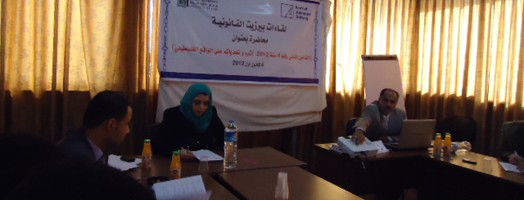The Gaza-issued Civil Law No. 4 of 2012: Effects and Challenges
Delivered by Dr. Anwar at Tawil, Lecturer at the University of Palestine, the legal encounter brought together a select number of lawyers, academics and interested groups.
Having welcomed the speaker and audience, Advocate Lina at Tounisi, Coordinator of the IoL Gaza Office, said the legal encounter reflected IoL’s attention to elaborate on and assess legal developments across the Palestinian territory.
In his opening remarks, Dr. Tawil stated reasons why the Civil Law No. 4 of 2012 had been enacted in Gaza. Providing an analysis of major provisions, he explained the relation between the newly-issued Gaza Civil Law and the Ottoman Civil Code (Mejelle) and comparative laws. Dr. Tawil highlighted that drafting of the new Gaza Civil Law is smooth, clear, accurate and concise. On the other hand, the Mejelle tends to be repetitive, verbose and exemplary. The new Civil Law differs from some comparative laws, particularly the Egyptian Civil Law, as it derives from norms of the Islamic Law. Still, certain comparative civil laws, including those of Iraq and Jordan, are closer to Islamic Law provisions both in form and in content. In relation to thematic components, Book One of the Gaza Civil Law covers obligations, including sources and provisions of obligation. Book Two addresses nominal contracts, including contracts of sale, lease, construction works and employment, as well as powers of attorney, gifts, etc. The Law also regulates (original and consequential) rights in rem. Dr. Tawil explained that the Islamic Jurisprudence has left its imprint on legal drafting of the Mejelle. In contrast, the newly issued Gaza Civil Law is imbued with modern legislative drafting techniques, especially featured in the Egyptian Civil Law. Drafting of the Mejelle is different from that of the (British Mandate-issued) Law on Civil Wrongs. Drafting techniques are thematically consolidated within the new Gaza-issued Civil Law.
With reference to the law-making process, Dr. Tawil addressed legal and constitutional predicaments associated with the new Civil Law, highlighting impact on the Palestinian context. Court judgements that apply the new Law will also impacts on the legal and judicial framework in Palestine. For example, if a case involves parties from Gaza and West Bank, will a conflict of laws be in place? Which laws will the court concerned enforce? Will the court refer to the Mejelle or the newly enacted Civil Law? Will each court put to effect its own applicable law?
In the ensuing discussion, participants recommended that, under the internal Palestinian political division, relevant authorities not promulgate legislation except in cases of necessity that cannot be delayed. Newly issued regulations should be enforced towards such time national reconciliation and unity materialise.
The legal encounter was organised in partnership with the Konrad Adenauer Stiftung.










